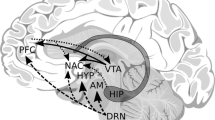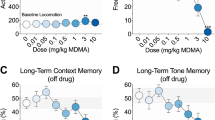Abstract
Rationale: Given that alcoholics drink for different reasons, it is not likely that a single pharmacotherapeutic agent will be equally effective for all alcoholics. Hence, the development of new pharmacotherapeutic agents that are capable of reducing alcohol intake remains an important focus in the field of alcohol research. Objective: The objective of the present study was to examine the effects of the δ2 receptor antagonist naltriben (0.60–4.0 mg/kg) on operant responding maintained by the presentation of ethanol (EtOH) or saccharin in alcohol-preferring (P) rats. Methods: P rats were trained under a concurrent schedule [fixed ratio (FR)4–FR4] to press one lever for EtOH (10% v/v) and another for saccharin (0.0125–0.05% w/v) during a 60-min session. Naloxone, a non-specific opioid receptor antagonist, served as a reference antagonist. Results: When responding maintained by EtOH and saccharin were equated under baseline conditions, naloxone (0.003125–0.75 mg/kg) reduced levels of EtOH-maintained responding by 46–82%. None of the naloxone doses significantly reduced responding maintained by saccharin. Naltriben (0.9–4.0 mg/kg) reduced EtOH-maintained responding by 44–76%, while saccharin-maintained responding was reduced only by the highest dose of naltriben (4.0 mg/kg). Analysis of the EtOH within-session response pattern revealed that naloxone suppressed EtOH-maintained responding during the entire operant session and led to early termination of responding. Low doses of naltriben (0.90 mg/kg and 1.2 mg/kg) suppressed responding during the latter portion of the operant session, while higher doses (2.0, 3.0, 4.0 mg/kg) decreased responding during the entire session and led to early termination of responding. Conclusions: The results of the present study strengthen previous reports from our laboratory suggesting that naltriben, the selective δ2 opioid receptor antagonist, suppresses EtOH self-administration in rats selectively bred for high EtOH consumption. The results also suggest that naltriben may be a potential candidate for use as a pharmacotherapeutic agent in the treatment of EtOH dependence.
Similar content being viewed by others
Author information
Authors and Affiliations
Additional information
Received: 20 March 1999 / Final version: 2 June 1999
Rights and permissions
About this article
Cite this article
June, H., McCane, S., Zink, R. et al. The δ2-opioid receptor antagonist naltriben reduces motivated responding for ethanol. Psychopharmacology 147, 81–89 (1999). https://doi.org/10.1007/s002130051145
Issue Date:
DOI: https://doi.org/10.1007/s002130051145




